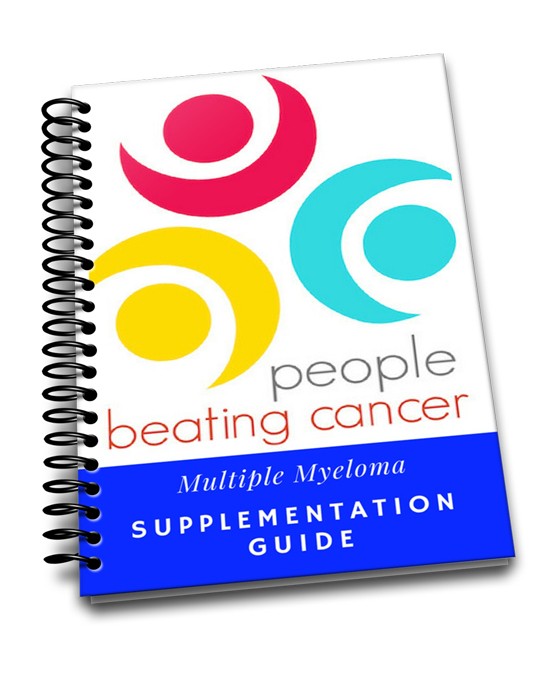
Recently Diagnosed or Relapsed? Stop Looking For a Miracle Cure, and Use Evidence-Based Therapies To Enhance Your Treatment and Prolong Your Remission
Multiple Myeloma an incurable disease, but I have spent the last 25 years in remission using a blend of conventional oncology and evidence-based nutrition, supplementation, and lifestyle therapies from peer-reviewed studies that your oncologist probably hasn't told you about.
Click the orange button to the right to learn more about what you can start doing today.
- You are here:
- Home »
- Blog »
- Multiple Myeloma »
- Multiple Myeloma Diet- Supplements Cause Psychosis?
Multiple Myeloma Diet- Supplements Cause Psychosis?

With the wide use of dietary supplements (for MM), it is becoming increasingly important for physicians to expand their knowledge to recognize the toxicities of supplement ingredients
Hi David- Do you know if taking multiple myeloma (MM) supplements can cause psychotic issues, such as confusion and hallucinations? Iʻm taking about 20 pills daily. Nothingʻs medically wrong with me, as I had brain MRI and brain scans (all negative). My neurologist believes itʻs caused by the pills and wants me to stop taking them.
I refuse to stop out of fear, since the pills are really helping my readings.
The good news…Here are my latest readings, which have improved significantly from one year ago:
IGG
9/10/18 1,039
8/30/17 2,359
FREE LIGHT CHAIN SERUM – K/L FLC RATIO
9/10/18 2.07
8/30/17 6.30
Any insight you could provide about the psychotic issue is appreciated.
Thank you so much David.
You ask an interesting question. First and foremost, its great to read about your recent numbers.
To address your question about MM supplements and psychotic issues, since you didn’t specify any particular supplement, my initial reaction was that my own personal experience is a no (my supplementation has never caused any psychotic issues) and that I have never read of any MM patients or survivors on any social media platform talking about supplementation and any sort of psychotic episode.
However I wanted to research the question further and I came across the study linked below. The phsychotic issues referred to in the study are herbs. With regard to your doctor wanting you to take a break from your supplements, I think you can consider stopping your daily supplementation and then slowly adding each back in your diet. This system shouldn’t interrupt the anti-MM effect.
Let me know if you have any questions.
Thanks,
David Emerson
- MM Survivor
- MM Cancer Coach
- Director PeopleBeatingCancer
Recommended Reading:
- Multiple Myeloma, Low-dose Maintenance Chemotherapy vs. Evidence-based, Non-Toxic Therapies
- Multiple Myeloma- Prognostic Value of Circulating Plasma Cells (CPC)
- Supplements, Nutrition and Cancer Care- A How-To Guide
Five Supplements and Multiple Psychotic Symptoms: A Case Report
Supplements and Psychosis
Interestingly, few case reports have demonstrated a link between herbal supplements found in Mr A’s supplement regimen and the onset of severe psychiatric conditions in patients with no prior psychiatric histories. Evcimen et al10 reported that acetyl-l-carnitine, an ingredient listed in Brain Awake, was temporally indicated in the onset of psychosis in a male patient who presented with auditory hallucinations. Furthermore, Norelli and Xu11 reported Panax ginseng–induced mania in 2 patients who were consuming ginseng on a daily basis and whose symptoms rapidly remitted after discontinuation of the supplement…
LITERATURE REVIEW
There is an increasing repertoire of reports9 detailing various psychiatric and neurologic effects related to the consumption of herbal medicines. Although the etiology is unclear, in the absence of other confounding factors, we suggest that Mr A’s acute-onset psychosis was caused by herbal supplementation…
CONCLUSION
With the wide use of dietary supplements, it is becoming increasingly important for physicians to expand their knowledge to recognize the toxicities of supplement ingredients and the potential herb-herb interactions in patients taking multiple supplements. In addition, the lack of a reliable regulatory body to monitor the herbal supplement industry shifts more responsibility to the physician to engage and educate patients about their choices in consuming these products. When a patient presents with acute psychiatric symptoms, recent supplement use, and a seemingly negative history, physical examination, and test workup, identifying the effects of supplement usage may prove useful in directing clinical decision-making.”


